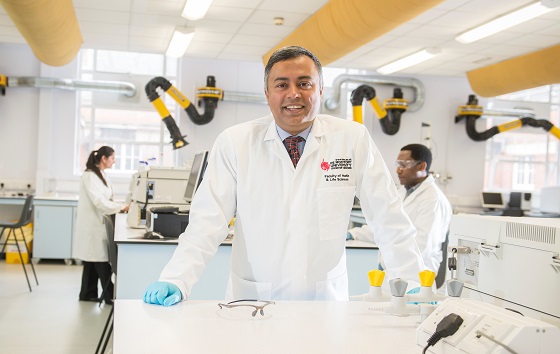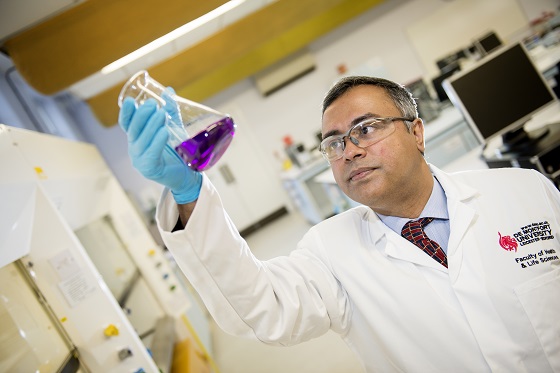A biomedical scientist from De Montfort University Leicester (DMU) has put forward a theory that could help explain the causes of a disease that has baffled scientists for 75 years.
Professor Parvez Haris says that Behçet's Disease is a rare inflammatory disorder in the veins and arteries that affects many body organs including the skin and mouth - which can ulcer - and inflammation and lesions in the eyes. It can lead to vision loss and blindness.

It has been nicknamed the Silk Road Disease because of its prevalence along the vast network of ancient trading routes that still connect China with the Mediterranean and its frequency is highest in Turkey and Iran. It was first identified by Hulusi Behçet in Istanbul in Turkey 75 years ago.
Parvez, who is also a Fellow of the Royal Society for Public Health, believes the common denominator with countries along the Silk Road is the use of herbal products such as rose water, which has been shown by researchers to contain methanol, a highly toxic form of alcohol.
Rose water is used – particularly in Iran, Turkey and countries in the middle-east - as a perfume, an aftershave, a drink, a medicine and a flavouring for food.
Some of the symptoms of methanol toxicity, including its effects on the eyes, skin and brain, are closely related to Behçet's Disease.
Parvez said: “Methanol can be present in herbal medicines as it is a naturally occurring chemical in plants. It is also used for extraction of ingredients from plants and can remain as a contaminant in herbal medicines. But their impact on human health remains unknown.
“The tradition of using herbal extracts in food, hygiene, fragrance, medicines and drinks has been a common practice in Silk Road countries since ancient times and it became popular across the region after Avicenna (Ibn Sina) invented distillation in the 11th century. Emphasis on cleanliness, the washing of hands and using perfumes developed in the middle-east and spread across the silk route.
RELATED NEWS
Nobel Prize-winning scientist No5 lectures at DMU
Did Napoleon meet his Water-l'eau?
Find your new home at DMU. Come to our next Open Day
“It is therefore more likely that the population in the Silk Road countries have a greater exposure to methanol on various parts of the body.”
Rose water’s popularity as a medicine has existed for 12 centuries. It was recorded as a treatment of Smallpox and Measles by Rhazes (Al-Razi) in Persia in the 9th century and it has been used by some for protection against COVID-19 in 2022.
Scientists in Iran have raised concerns regarding high levels of naturally occurring methanol in rose water.
Parvez said: “As a consequence of its value in hygiene, medicine and fragrancing, rose water became a valuable commodity for trade and its use spread throughout the Silk Road countries. There are records of Chinese emperors washing their hands with rose water before and after meals.
“Behcet disease occurs between 20 to 40 years. It is more prevalent among women in the USA but it affects more men than women in the middle-east.
“During this age range, bodily grooming and beautification is likely to be at its peak, including use of perfumes that may be possibly contaminated with methanol. Since people are already getting exposed to methanol from fruits, fruit juices and alcoholic beverages, additional exposure from herbal products may make the difference in triggering disease in some, perhaps in those with the highest exposure or those who are genetically susceptible.
“Like rose water, Kolonya – a cologne used extensively in Turkey and some middle-eastern countries - is not only used for hygiene and fragrance but also as a traditional medicine for babies up to adults and, over the last two years, many people in Turkey have been using Kolonya for protection against coronavirus infection.
“Since methanol is cheaper than ethanol, some Kolonya has been deliberately adulterated with methanol by unscrupulous and dishonest manufacturers which is placing people’s health at risk.”

Scientists in Turkey have expressed concern about the dangers of methanol in Kolonya and the Turkish government has advised the public to be careful about buying fake Kolonya that may be contaminated.
Parvez presented his paper about Behçet's Disease and its links to rose water/methanol at an international event last week and he has also shared his findings with Japanese scientist Professor Shigeaki Ohno, who first suggested that Behçet's Disease is more prevalent in Silk Road countries.
“Professor Ohno quickly responded to my letter stating that he found the hypothesis very interesting and I am in contact with him to discuss further.” Parvez said. “He is a truly amazing scientist who spent many years of his life searching for a common environmental factor in Silk Road countries that could explain the high prevalence of Behçet's Disease in this region.
“What I have suggested may be what he has been looking for and it could pave the way for prevention of Behçet's Disease and lead to greater awareness about potential dangers of using hygiene and herbal products contaminated with methanol.
“At the same time, a multinational study in Silk Road countries investigating the exposure to methanol from herbal products and other sources is urgently needed.”
Posted on Friday 18 March 2022